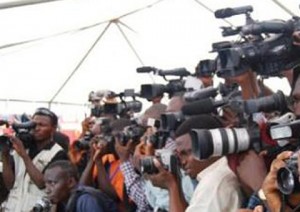More Ghanaians want curbs on media freedom – report
 A study by the National Commission on Civic Education (NCCE) shows that more than 55 per cent of Ghanaians want a curb on media freedom.
A study by the National Commission on Civic Education (NCCE) shows that more than 55 per cent of Ghanaians want a curb on media freedom.
However, about 35 per cent of the respondents were against restrictions on media freedom while 9.48 per cent adopted a neutral stance.
Although Ghana’s 1992 Constitution provides for freedom and independence of the media, results from the study indicates that majority of Ghanaians want a form of restriction on the freedom the media enjoys.
The NCCE embarked on the study in September 2014 to ascertain the public assessment of the effectiveness of the media in Ghana’s democracy.
The report dubbed “Assessing the Effectiveness of the Media in Ghana’s Democracy”, aims at assessing the link between the role of the media and democracy and the contribution of the media to Ghana’s democratic stability and success.
Additionally, the research explored the possibility of actions that can be taken to improve the performance of the various media establishments.
The study was cross sectional, conducted as a representation of the national population covering 72 of the 216 districts in the ten regions of Ghana; with a total of 2,910 respondents, 18 years and above being interviewed.
The report which was sponsored by the European Union was launched on Wednesday in Accra by Mr Joe Baidoe-Ansah, the Member of Parliament for Kwesimintsim.
Commenting on a portion of the study which shows that 75.2 per cent of Ghanaians believed that politicians are acting in their interest, Mr Baidaoe-Ansah explained that the media had allowed politicians to use their platforms to broadcast propaganda messages to the public.
He urged the media to focus more on technical people and intellectuals who would educate and empower Ghanaians as well as politicians themselves.
Findings obtained from the study showed that radio is a broader source of information for a majority of Ghanaians.
In assessing the credibility, neutrality, and independence of the media, 46.9 per cent of respondents found the news they receive to be credible, 32.5 per cent found it neutral and 17.6 per cent also viewed the news as partisan.
Ms Josephine Nkrumah, NCCE Deputy Chairman in-charge of Finance and Administration, said key findings from the research showed that the media play a critical role in Ghana’s democratic development; she, therefore, called for the strengthening of the media to enable them live up to their mandate.
The research showed that majority of the respondents prefer a form of restriction on media freedom and adding that certain media outlets should be controlled in their dissemination of news and information.
Mr Kabral Blay-Amihere, former Chairman of the National Media Commission (NMC), expressed concern with those calling for the curbing of media freedom.
He said such a move is against the spirit of Ghana’s Fourth Republican Constitution.
In relation to performance of the media, the report revealed that majority of the respondents were of the view that the media was doing a good job.
Also in assessing professionalism, 58.8 per cent of respondents said the practitioners do exhibit competence and professionalism at work whilst 34 per cent said they do not exhibit competence and professionalism.
Professor Audrey Gadzekpo, the Dean of the School of Information and Communication Studies, University of Ghana (UG), lauded the report for declaring that the media in Ghana was doing well.
Respondents also mentioned some major roles of the media and notable among them were to disseminate information, educate the public and provide entertainment.
Quite a significant number of respondents said the media was promoting democratic stability and success in Ghana and has helped the country’s democracy.
A high number of respondents were also happy with the current state of the media and how it portrays both the opposition and the government in power.
Through news and information gathered from the media, majority of the respondents; 75.2 per cent were of the view that the various political parties were not acting in the interest of Ghanaians and among the reasons given were that the political parties were corrupt, more loyal to their party interest than that of the national interest and they make campaign promises which they cannot fulfil in order to win power.
Also, there were a number of suggestions given on how political parties should treat each other. About 49.1 per cent of respondents called for tolerance of each other while 18.7 per cent said they should accord respect to each other.
As regards suggestions on how to improve upon the media in Ghana, 27.9 per cent of respondents said all media practitioners should have professional training;, 17.9 per cent were of the view that the National Media Commission (NMC) and other regulatory bodies should be more efficient; and 13.7 per cent said there should be a strict adherence to laws and policies guiding media practice in Ghana.
In effect, the report makes a judgment about the ability of the media to produce desired results towards Ghana form of government in which the supreme power is vested in the people and exercised directly by them or by their elected representatives under a free electoral system.
Prof Kwame Karikari of the School of Information and Communication Studies, UG, described the study as being more of a perception and not a study of knowledge.
Mr Samuel Asare Akuamoah, NCCE Deputy Chairman in-charge of Administration, called for a critical look at the role of media ownership and journalism professionalism.
Source: GNA
